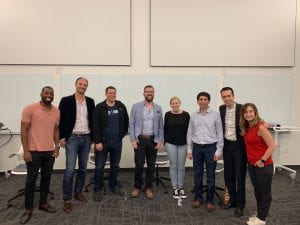April BlockTalk Panel: Show Me the Money
On Wednesday, April 24, the Graduate Blockchain Society hosted their April BlockTalk on issues relating to blockchain. About 30 MBA and computer science students were in attendance for a panel discussion headed by Professor Cesare Fracassi. On the panel were Chris Clasen of Digital Asset, Jacob Cantele of ConsesSys and Gaurav Chawla of Dell Technologies.
The panel covered a variety of topics including: making money in blockchain (enterprise vs venture solutions), private vs public blockchains, the pros and cons of utility tokens, the self-sovereign identity use case, current pain points in blockchain mass adoption, how students can get involved with blockchain and where to look for resources.

(From left to right: Korey Wallace, Co-Pres GBS; Professor Fracassi; Chris Clasen, Digital Asset; Jacob Cantele, ConsenSys; Amy Lovejoy, Pres MBA Tech Club; Gaurav Chawla, Dell Technologies; Carlos Colon-Vonarx, Co-Pres GBS; Ashley Klepach, VP External GBS)
One of the most interesting topics centered around understanding how each company currently monetizes blockchain. The three panelists described a diverse mix of business models from consulting services, app development & integration services, licensing & support of embedded smart contracts engines to VMware, to blockchain platform as a service. At this time, the money appears to be in enterprise solutions.
“It’s all open source, with the exception of a few applications we have developed for our investors, stated Chris Clasen of Digital Asset, when referring to the company’s smart contract engine, DAML.
“Our old strategy to make money was we have a platform, it’s proprietary. Pay us for that. We will develop solutions for you. Pay us for that. It’s difficult to scale that type of business.
Our new business model has shifted to get our smart contract engine as wide as possible. The first way to generate revenue is through embedded, OEM-type models. That’s likely going to generate some revenue for the short term. We are biasing towards getting our it out there and letting people use it. We are not trying to squeeze every penny out of it. It’s really a land grab play. The longer-term revenue path for us is to monetize additional tools on top of the DA ledger.”
Gaurav Chawla of Dell Technologies added there are ways beyond building a platform for companies to make money.
“One is the consulting, services, integration side of the business. When you consult with the customer and you look at their use cases, are they trying to use blockchain for a ‘formal fear of missing out’? If so, then don’t use it, but [sic] if there’s a real value in using the blockchain?”
“Second, development skills are hard to find. So, consulting and development of apps for a particular vertical is a place to make money.”
The panel also shared various perspectives on public and private blockchains, with the notion that private blockchains may really be a short-term solution until mass adoption and maturity of public blockchains.
“Now it becomes a question of the storage backend you care about and pick the right solution for the job,” said Clasen. “Public chains are good for some use cases, traditional private blockchains are good for others. Distributed ledgers have other characteristics and tradeoffs. What we are seeing now is, blockchain had all of these bundled together. Now people are seeing the stacks modulize [sic] and people pulling out the parts that matter for their workloads.”
Jacob Cantele disagrees and believes the blockchain and distributed ledgers are important as a whole.
“The use cases of the Ethereum blockchain and part of why people use them is you have a decentralized system that’s immutable and that’s secure,” stated Cantele. “All of those things are amplified by having a further decentralized system.”
Business students often underestimate the importance of business contribution to blockchain development, but some of the most pressing issues facing blockchain now are surrounding business model generation, governance structures and financial products. These are all areas where business students can add value.
For those interested in learning more, ConsenSys provides basic knowledge and tools for ethereum via Kauri (https://kauri.io/) and provides blockchain boot camps at various times throughout the year via its academy (https://consensys.net/academy/bootcamp/). Digital Asset also provides a download of DAML developer SDK app and tutorial walkthroughs to start creating your own smart contracts (https://daml.com/).